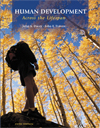 |  Human Development Across the Lifespan, 5/e John S. Dacey,
Boston College
John F. Travers,
Boston College
Late Adulthood Physical and Cognitive Development in Late Adulthood
Learning ObjectivesAfter reading this chapter, the student should be able to complete the following goals:
1Discuss the major physiological theories of aging. |
 |  |  | 2Discuss genetics and aging with reference to twin studies. |
 |  |  | 3Discuss environmental aspects of aging. |
 |  |  | 4List the major modifiers of ability, and summarize the relationships between the hypothesized factors that affect aging of physical and mental systems. |
 |  |  | 5Explain changes that occur in late adulthood related to reaction time and their orgins. |
 |  |  | 6Specify the changes during late adulthood in each of the four senses presented and other body systems, including speech. |
 |  |  | 7Summarize health concerns in late adulthood. |
 |  |  | 8Explain the discrepancy found between tested ability and actual performance of intelligence among the elderly. |
 |  |  | 9Define terminal drop in adult intelligence and its relationship to personal perception of impending death. |
 |  |  | 10Compare and contrast the Alpaugh and the Jacquish and Ripple studies of creativity in late adulthood. |
 |  |  | 11Outline Dacey's theory of creativity and list critical periods of life during which creative ability is best cultivated. |
 |  |  | 12Compare wisdom, intelligence, and creativity as suggested by Sternberg. |
 |  |  | 13Present the five factors that produce wisdom, according to Baltes and Staudinger. |
|



 2002 McGraw-Hill Higher Education
2002 McGraw-Hill Higher Education